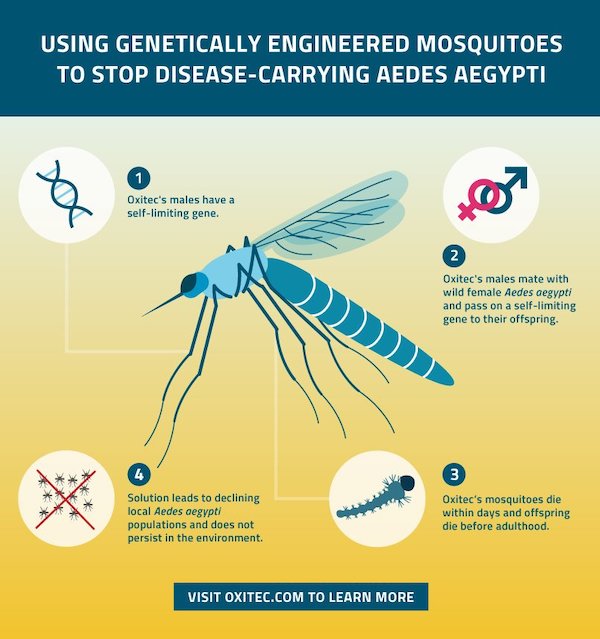
Genetically modified mosquitoes are in the news again with new EPA permits making it possible the critters could be released in Florida and Texas this summer. Oxitec, the company behind the GM mosquitoes, was granted an experimental use permit to release millions of them into the Florida Keys and around Houston over the next two years in an effort to reduce the spread of mosquito-borne illnesses.
The mosquitoes are not new. Oxitec has been around since 2002 with the aim of combatting insects that transmit diseases and destroy crops, according to their website. Oxitec’s mosquitoes are a genetically altered variety of the Aedes aegypti species, which is a known transmitter of dengue, chikungunya, yellow fever, and Zika viruses. The lab-bred mosquitoes are all male. When they mate in the wild, the female offspring are supposed to die, accomplish two key things. First, it effectively thins the mosquito population and could, in theory, eventually cause it to collapse completely. Second, females are the ones that bite so reducing those numbers means fewer disease transmitters.
Oxitec has carried out several trials over the last decade, the largest being in Brazil from 2013 to 2015. The company claims its method successfully reduced the native mosquito population in the trial area by up to 85%. There was a dispute about their reported success last summer but in March of this year, 6 of the 10 scientists involved in the critique withdrew their support. Long story short, the scientific community felt the version of critique as-published was misleading and used questionable science.
The company is currently awaiting regulatory approval in Florida and Texas so it’s still unclear if these field tests really will get off the ground. Pending approval, testing will take place over a two-year period in Monroe County, Florida, starting this summer, and in Harris County, Texas, beginning in 2021.
If these trials are successful, Oxitec is already working on how to scale its technology. The company has developed a way to packetize the eggs of its male mosquitoes into Friendly™ mini-capsules that actually look just like a pill. According to the company, end-users just place them in water and adult GM mosquitoes soon follow. Oxitec says the delivery method will allow for “targeted suppression with simplicity, scalability, and economic sustainability” that can work for government and communities of all sizes and incomes.
Oxitec says a just completed a trial of the Friendly™ mini-capsule in Brazil showed the method suppressed 95% of disease-carrying Aedes aegypti in urban, dengue-prone environments following just 13 weeks of treatment. I wasn’t able to find any outside reviews of their data but the product sounds pretty ingenious if it does indeed work. Oxitec is also developing similar suppression technology for fruit flies, diamondback moths, and soybean loopers. Learn more from their website HERE. (Sources: Nature, The Conversation, Bloomberg)









